During a prayer service on June 17, 2015, nine members of the Emanuel African Methodist Episcopal (A.M.E.) Church in downtown Charleston, South Carolina, were killed by a 21-year-old white supremacist. He confessed to the shooting in hopes of igniting a race war.
Mother Emanuel: An American Musical Play, inspired by the lives of the Emanuel Nine, a.k.a. the Charleston Nine, was co-written by Adam Mace and Christian Lee Branch, and conceived, co-written, directed, and choreographed by Rajendra Ramoon Maharaj. It premiered at last year’s New York Fringe Festival to outstanding reviews.
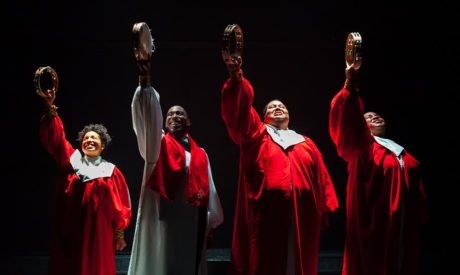
Commemorating the second anniversary of the tragedy, the show just had its Philadelphia premiere at the New Freedom Theatre, American’s oldest black theater. “Although the show is ultimately the result of an act of hatred, the directors, writers, and actors involved made an intentional effort to magnify the love and faith that the nine victims shared, making it a celebratory production. There is no mention of the killer in the whole show as we wanted to tell the stories of the nine so that they live on through our voices,” according to actor Lauren Morgan.
Morgan and her three fellow actors—Christopher Augustin, Christian Lee Branch, and Sabriaya Shipley—portray the Emanuel Nine, taking on numerous roles in rapid succession. All four not only agreed to an interview, but addressed a number of difficult subjects.
Looking back at your childhood and adolescence, what were some of the pivotal scenes that made you feel connected to the theater world?
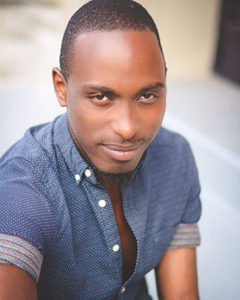
Christopher Augustin: I had a childhood full of the arts: growing up in the church, my father played piano and trumpet with the Praise and Worship team, and my mother directed the theatre department. She would put on full plays annually — writing and directing them herself — and I was regularly involved. Although I was also engaged with music and writing, I connected to theatre. The reality of imagination in theatre stuck out. I was never ashamed to share that experience with other people.
Sabriaya Shipley: I started doing theater when I was six after seeing my first musical, The Lion King, in my hometown of Baltimore, Maryland. I remember being not only fascinated by all the puppets and animation, but being completely captured by Rafiki. In her number, “Rafiki Mourns,“ I wept.
My mom was so caught off guard by how entranced and focused I was, even though I didn’t understand a word the actress was singing, that I simply said, “I feel it, Mommy.” From that day on, I wanted to be on a stage, making somebody feel something — not to control anybody, but to give others the gift I had received my first night at the theater.
Christian Branch: The first thing that sparked my love for theater and performing was singing with my family at Christmas time. We would visit my great-grandparents and all the cousins would stand at the front of the living room and sing carols for the adults. Ever since, I have been hooked on performing for people.
Lauren Morgan: In my childhood, I enjoyed singing and dancing. As an educator, I use music and movement to teach children. Even though I was late entering the world of theater, I recently took a chance auditioning. The experience felt so organic, as well as healing, that it has been a calling and a passion ever since.
Mother Emanuel shows the devastating results of racism. How did your personal experiences with racism affect your performances in this production?
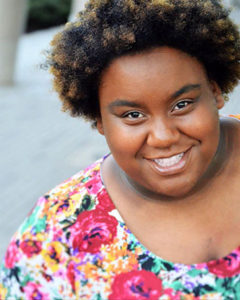
Sabriaya: I grew up in the Southern Baptist tradition, and although I don’t agree with all the ways of the church, I love and understand the important role the Black Church has played throughout American history. Performing in Mother Emanuel is my way as a black artist of paying homage to that part of my ancestral roots, filled with church mothers, soul steadying hymns, and guiding sermons.
That’s why it is important for me that people feel my work. As a proud black woman, I find myself wanting to dedicate my art to telling the vast stories and experiences of my people.
Christian: I feel fortunate to live in a community where racism is not blatant or condoned. However, this environment has not shielded me from micro-aggressions. For instance, when people are staring at me and I realize that I’m the only person of color in the room. While these kinds of incidents might seem small, but when repeated, they leave me with a feeling of being weird and sometimes even wrong for being different.
Lauren: I experienced two different types of prejudice. For many years, I struggled with low self-esteem because of the way I was treated by those I felt were supposed to be my brothers and sisters. Although I am African American, I have a lighter skin tone. For much of my life, I did not feel accepted by my own race because some folks thought that I’m not “black enough,” or they believed that I see myself as “better than others,” which is certainly not true.
The other experience was as a kindergarten teacher. When taking my group of children to outdoor parks in a predominantly white area, there were “looks” that I would catch from those who saw us coming from afar. They would then change route or leave. Sometimes these reactions could just be because it was a large group, but I noticed it.
Christopher: The most racism I faced was within my own culture. I was raised in North Haven, Connecticut, till I was 13, as only one of two or three students of color in the school. Then we moved to New Haven, where I went to predominantly black schools. It was there that I faced discrimination. At one point, in the middle of class, someone asked me “Are you sure you’re black?”
As a kid, it was rough. I even came to fear black people and black culture, but as an adult, I have grown beyond that. Racism isn’t just one race against another. I have been able to use that awareness to draw attention not only to this play, but also to cultural stereotypes that we may hold in today’s America.
What did you do in preparation for this demanding performance?
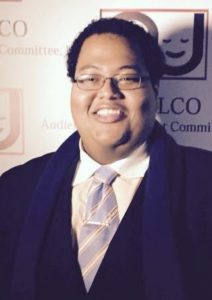
Christian: Being one of the co-writers, I was fortunate enough to have all the research that went into writing the show at my disposal. Also, having conversations with members of the A.M.E Church, coupled with my own religious traditions, helped me connect to the Bible study and church service experience.
Christopher: I researched both A.M.E and the Rev. Clementa Pinckney as pastor and senator, watched many newscasts and videos, and read articles about his work. I also used my personal Christian history and church life to connect and prepare for this role. Throughout this process, I listened to gospel music continuously to stay in character.
Lauren: In the writing process, there was much research that took place including articles, meeting with family members, and visiting churches. As the production actually falls on the date of the shooting this year, there are many resources available about the Emanuel Nine.
Lauren: As a company, we all researched the lives of those we had to represent in the stories, but eventually learned about each individual life as we brought it all to the table and still do to this day. I personally met with family members and visited churches.
Sabriaya: The process of bringing this piece to life has been a reflective study for me on my Southern Baptist upbringing. I not only had to gather information about the A.M.E Church and the black church in general, but I had to examine their roles in my life and that of the Charleston Nine.
What did you do to prepare for the difficult task of presenting a number of different roles?
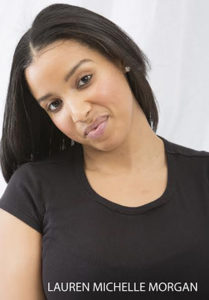
Lauren: It took a lot of rehearsals, as well as one-on-one coaching with the directors, to best represent each of the nine. Although it was a great challenge to only have four actors to tell the story with minimal props, we all knew that this was bigger than us, and the most important thing was honoring the lives of the nine. Through this process, we had an understanding that we could never fully “portray” or “become,” but our goal was to use the information we had to represent each life to the fullest.
Christopher: As an actor, I have built a strong connection with breath — breathing in one character or idea and out another. But before that could happen, I had to define each character. So, really studying my characters, knowing who they are, was an important factor. Once I had made those personal connections, the breath did its work.
Sabriaya: My most pivotal task tackling these many different roles was making them distinct and specific, so that their stories are clear and honor each individual. In this play, I portray up to six different people, and all six contribute to the story at large.
Christian: The hardest part of performing multiple roles was making sure each character had a unique identity. Focusing on the way they sit, speak, and interact with the other characters took time and a lot of practice.
Is there anything else you’d like to share?
Lauren: In the beginning of the process, there was a lot of doubt on my part. I felt I was not good enough to really be a part of this production. Over time, I realized that this play was bigger than me. I felt honored play these women and tell their stories, which put everything in perspective.
As a teacher, I can relate to Myra Thompson and her love for her students, especially the impact that she had on them — something that no one can take away. Susie Jackson reminded me of my grandmother, who was full of love and energy. Lastly, I could relate to Rev. Sharonda Singleton, an athlete, because of my love of dance and being active. Linking up with her passion and fire for God took me to another level spiritually. My life will never be the same.
Christian: I began this journey with [co-writers] Adam and Rajendra, looking for a way to deal with the hurt of this tragic event. By researching, writing, and performing, I have come to a deeper place spiritually and in my relationships. More so than any other project, Mother Emanuel has inspired me to be a better human and citizen of the world.
Christopher: It has been a beautiful adventure and honor to pay respect to these nine individuals and their families. I am proud to have been a part of this process. This play has reminded me about the blessings in the storm, the center of calmness and silence, the blessings in tragedies — something that I plan to keep and use in my life from here on out, or, as Barack Obama once said, “a manual on how to avoid repeating mistakes of the past.”
Sabriaya: It has been an honor and privilege to pay respect with love to these lives lost at the hand of hate. Mother Emanuel is a representation of blessed storytelling and Sankofa [an African word from Ghana: “it is not taboo to fetch what is at risk of being left behind”].
Running Time: One hour and 30 minutes, with no intermission.
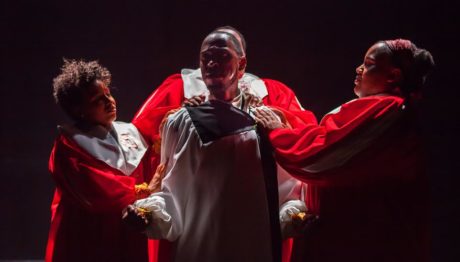
Mother Emanuel: An American Musical Play plays through June 25, 2017 at New Freedom Theatre — 1346 North Broad Street, in Philadelphia, PA. For tickets, call the box office at (888) 802-8998, or purchase them online.




